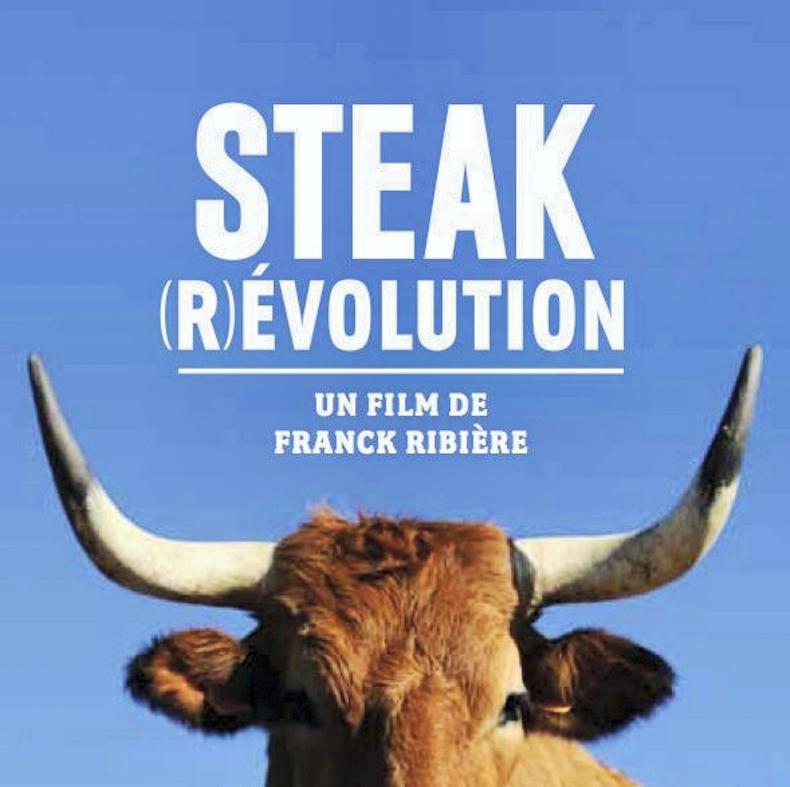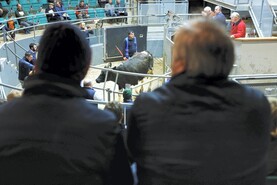Franck Ribiere is back in Scotland to film his second film on the world of beef. This time he is looking at how Scotland is blessed with the best beef in the world. Frank’s first film Steak (R)évolution, looked for the best steak in the world which took in Japan, Spain, Scotland, England, USA, Corsica, France and Argentina.
1 So Franck what takes you to Scotland?
Well I did the movie and the book and I thought I was done. But then it built momentum and was taken up by Netflix and people kept asking me for the follow up. So I said if I was to do anything, then I wanted to go back to the beginning and look at the start of the cattle story and this brought me here.
In my search for the best steak I ate at 200 restaurants and visited 25 countries, and the best cattle breeds come from the same place; Scotland.
So I came to Scotland and I wanted to know why the cattle are so special. And I have to say I was surprised at much cows and cattle mean to Scotland and its history. So it fits with me wanting to do something where we go back to the beginning and the original roots.
I want to know why beef is so important to Scotland. It’s a real cultural thing in this country.
Scotland has managed to keep a strong cultural link to its beef which has been lost in other countries, where production is more industrial.
At the end of the day when you have a ruminant, they need grass, they drink water then they make meat. Scotland has all these things.
2 Your first film caused controversy in France when it proclaimed beef from the UK superior. Which of our breeds will you be looking at on your trip?
The most interesting breed in the world is the Angus. If you compare all the breeds in the world for quality beef Scottish breeds like Belted Galloway, Luing, Shorthorn and Highland come out on top. I like the Galloway’s old-fashioned taste.
They all have something in common which makes them superior to any breed in the world. Even better than French ones, better than continental ones. In the movie I want to know how Scotland has managed to get this position.
3 Do you have any inclination to why this could be the case?
Well so far my answer is weather. It’s what all your best products have in common, whisky, salmon and beef, all of them rely on your water. Water makes the best grass, if you have good grass you have good breeds for grass finished cattle.
The Scottish have the ability to turn grass into fat and this is not the case for many breeds around the world. It’s a key difference between continental breeds and Scottish breeds.
4 As you will know, our most popular breeds are Limousin and Charolais, so Scotland seems to be producing a lot of continental cross beef, does this diminish our reputation?
It’s only for commercial reasons this is happening not to do with quality.
Crossing continentals with Angus is what the market demands, but it does not make the best-quality beef.
These cattle will not have better than the pure.
People rear cattle where they shouldn’t, when I visit Marseilles in the south they ask why they can’t rear good beef beside them. I just tell them they should eat fish and leave cattle rearing for other people.
A farmer is someone who knows his culture, earth and farm and knows what he can and cannot do with the land.
5 You talk a lot about slower-grown grass fed cattle which is disadvantaged by the current EUROP grid system for paying farmers. Do you think it is time for a change?
Yes. The European system is damaging the quality of meat, it is the worst thing happening to the beef sector. The best beef comes from the quality of the fat and the grass.
6 What about Wagyu and aged Spanish beef, is this not the best beef in the world?
Wagyu is in the class of its own, it is beef foie gras, a very different product. But remember it’s a carcase of 180kg which is totally impractical on a commercial scale.
The best meat I found on my travels was in Spain from a 750kg carcase on a 15-year old steer, matured for 160 days. Again, I realise this isn’t practical for farmers. But here in Scotland you have the quality and the ability to produce commercially.”
7 Surely a lot of what you are advocating will impact on farm efficiency so how will farmers managed to produce enough to make a living?
When you buy a bottle of 10-year old Bordeaux you know its more expensive than a five-year old bottle of Bordeaux. This is what happened over the last 20 years in wine where France focused on quality, beef will go the same way. People will increasingly pay for quality. Over the next 10-20 years fewer people will eat meat but the quality will improve. We don’t have to fight against the vegans. The more vegans we have the better the meat will be.”
Franck’s film Don’t look back in Angus will be out at Edinburgh Festival next year. Steak (R)évolution is available to buy on Amazon or to stream on Netflix.






 This is a subscriber-only article
This is a subscriber-only article














SHARING OPTIONS: